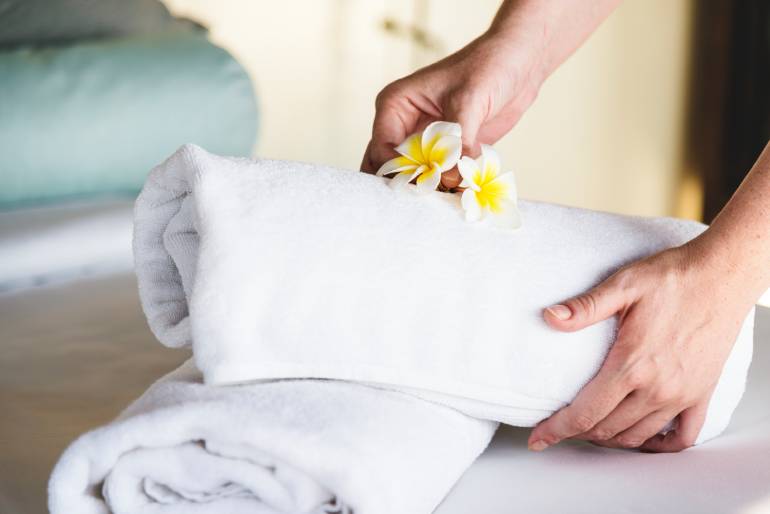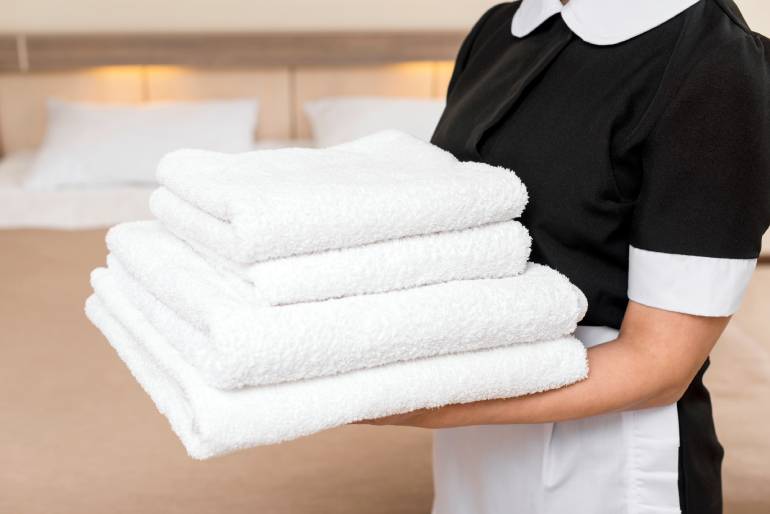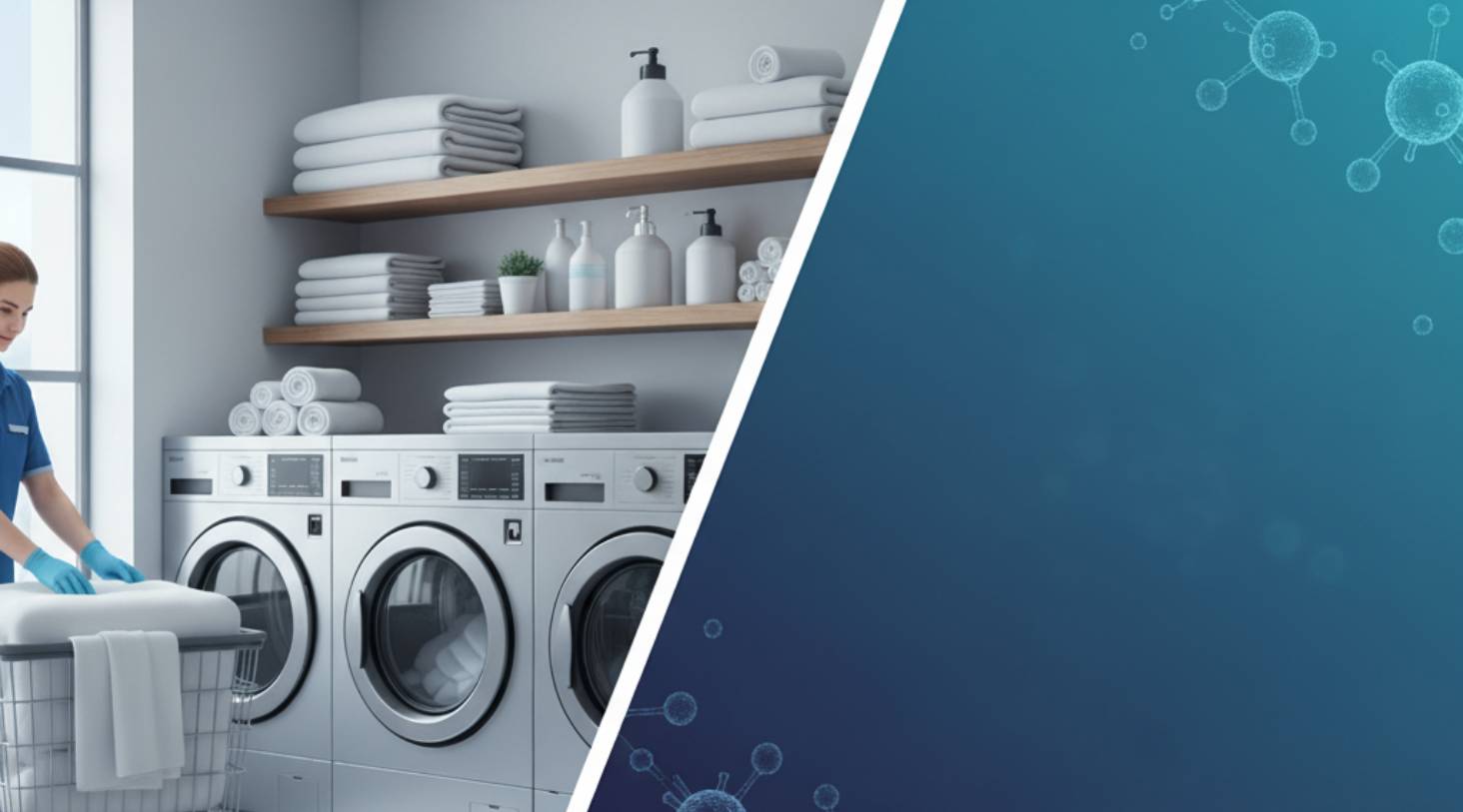Bangkok is buzzing again. Tourism is surging, new hotels are opening, and luxury wellness experiences are defining the capital’s hospitality identity. But behind the polished service rituals and glittering décor, a quieter transformation is underway—one that begins in laundry rooms, not lobbies.
Clean sheets have always been expected. In 2025 and 2026, sheets must be sanitized, odorless, traceably hygienic, and demonstrably safe. Towels must feel fresh from the spa even after dozens of cycles. Guest laundry is expected to return looking immaculate, with zero doubts about cleanliness. No longer is laundry simply an operational task; it has become a guest reassurance strategy.
In an era where a single review can decide a booking, hotel laundry hygiene has become the frontline of Bangkok’s tourism credibility.
Bangkok’s Unique Hygiene Pressure
Hotels in Thailand’s capital face challenges few other tourism hubs encounter simultaneously. A tropical climate means constant heat and humidity—perfect conditions for bacterial regrowth if linens are not treated properly. Spa culture is booming too, which means massage oils and skin products saturate towels and robes, demanding specialized sanitization that typical in-house laundry setups simply can’t handle. Add rapid turnover from pools, gyms, and restaurants, plus the city’s role as a global center for medical tourism, and suddenly the hospitality industry must achieve near healthcare-level hygiene, at hotel scale.
Guests may not see the science behind fresh linens. But they feel it—on their skin, in the scent of the room, in the softness of a towel. When hygiene slips even slightly, it shows up in the worst possible place: public reviews.
The New Rules of Clean: Sanitization Over Washing

Laundry used to be about removing visible dirt. Now, it’s about eliminating invisible threats. Hotels are being evaluated on disinfection protocols that ensure pathogenic risks are neutralized every single cycle.
That starts with thermal disinfection, where linens are washed at sustained high temperatures scientifically proven to kill bacteria and viruses. Time and heat must work together—fluctuating water temperatures or rushed cycles simply don’t meet current tourism expectations.
Chemistry plays a new starring role too. Antibacterial detergents infused with enzymatic agents have replaced generic washing agents. These advanced formulations don’t just clean the fabric surface—they break down sweat, oils, and microbes deep inside fibers. And they do so without damaging softness or skin compatibility.
The invisible finishing touches matter as much as the wash. Linens now require pH balancing to match human skin, something only professional dosing systems can achieve reliably. Without it, towels feel scratchy, and sensitive guests experience irritation.
In 2025 and 2026, smell tells the story. Fresh should smell like nothing at all—just clean. Anything else signals an operational failure.
Where Hygiene Fails First: Drying Rooms & Storage
Ask any Bangkok hotelier about humidity and you’ll see the look. They know. When towels come out “almost dry,” they risk developing a faint musty odor by the time they reach a guest room. That odor is bacteria announcing its return.
Professional commercial laundry facilities are now equipped with humidity-controlled dry-down systems, air filtration, and cool-fold technology that ensures linens leave fully dry, stable, and unable to re-activate microbial growth while stored or transported.
Hotels trying to replicate these conditions in cramped OPL spaces behind service corridors are fighting a losing battle.
Clean Means Controlled: Zoning, Handling, Traceability
In the most advanced laundry operations—especially those serving Bangkok hotels—dirty laundry never shares air, floorspace, or machinery path with clean linen. Soil-side and clean-side separation has become a non-negotiable design principle. The process operates more like a sterilized production line than a traditional wash house.
Staff hygiene, airflow direction, sealed transportation cages, and minimal human handling all contribute to a closed loop of protection. In some Bangkok facilities, RFID and barcode tracking now monitor linens like inventory in a luxury boutique—every item’s journey is recorded, every cycle noted.
This tracking improves linen lifespan while preventing loss…but more importantly, it creates audit-ready hygiene proof.
That proof matters. Tour operators, MICE planners, wellness retreat organizers, and medical tourism agencies increasingly require hygiene verification long before recommending a hotel.
Standards Every Bangkok Hotel Must Now Know
Global and regional tourism authorities are tightening compliance expectations. Thailand’s own SHA+ programs successfully elevated hygiene visibility during reopening—now, that momentum is evolving into a new baseline. European RABC standards, ISO hygiene certifications, and strict chemical safety audits are influencing what qualifies as acceptable in Bangkok’s urban hospitality economy.
These programs are not mere marketing stickers; they are frameworks ensuring that guest-facing items—bedding, towels, spa linens, restaurant napery—are free from microbiological risk. Hotels expanding into health-conscious markets must align accordingly.
The luxury guest doesn’t ask to see your certification.
They assume you meet it.
Failing that assumption costs real revenue.
Spa Linens: The Most Hygienically Demanding Fabrics in Bangkok
Spas are where guests seek purity. Ironically, spa towels are the textiles most vulnerable to odor retention and bacterial survival. Essential oils, rich moisturizers, herbal compress residues—these require specialized pre-treatment and enzymatic chemistry that many hotels cannot manage internally.
The slightest failure shows up as greasy texture, discoloration, or a stubborn scent that refuses to go away. And because Bangkok is a global spa destination, expectations for softness, brightness, and cleanliness exceed standard hotel requirements.
Commercial providers now manage spa linens using dedicated wash programs, separate chemical lines, and fabric-protecting finishing processes designed to maintain a luxury hand-feel.
A robe that looks used breaks immersion. A robe that looks and feels new creates magic.
The Relationship Between Hygiene and Guest Reviews
On Agoda, Booking.com, and TripAdvisor, Bangkok hotel reviews consistently rank cleanliness as the number one driver of satisfaction. Even exquisite properties have been dragged down by criticism of:
- “musty sheets”
- “damp-smelling towels”
- “scratchy texture”
- “stains on bedding”
- “spa robe smelled used”
Negative laundry mentions become negative booking decisions.
Conversely, one short line like “the bed was incredibly fresh” often tips a review from four stars to five.
Laundry hygiene is not a backstage factor—it is a direct contribution to ADR (Average Daily Rate), occupancy, and brand ranking.
Outsourcing: Where Hygiene Meets Operational Intelligence

The past few years have pushed many Bangkok hotels to ask a blunt question:
Is maintaining an in-house laundry really the best use of our space, labor, and capital?
Increasingly, the answer is no.
Professional commercial laundry providers—especially those designed for the hospitality market—now deliver disinfection precision, fabric care expertise, sustainability innovation, and peak-season scalability that most OPL environments cannot match.
Hotels that outsource gain:
- Better hygiene outcomes without capital investment
- Guaranteed overnight turnaround and peak flexibility
- Smart dosing and water/energy efficiency
- Zoning architecture that prevents contamination
- Hygiene auditing and operational transparency
They also remove an entire layer of HR complexity, equipment maintenance, compliance risk, and sustainability reporting from their internal workload.
In the post-pandemic era, cleaning is science, and science belongs with specialists.
Where Bangkok Hospitality Is Heading
Laundry hygiene in Bangkok’s hotel industry will keep evolving over the next two years. As sustainability expectations rise and wellness tourism expands further, standards will only increase. Automation and IoT monitoring will continue reducing human handling. Linen lifecycle analytics will inform purchasing decisions. Certifications will become brand essentials instead of optional badges.
But one belief will remain unchanged: linens are intimate trust points. They define how safe, how cared for, and how comfortable a guest feels in the place they sleep. When that trust is well-managed, revenue follows. When it breaks—even subtly—the damage echoes loudly online.



